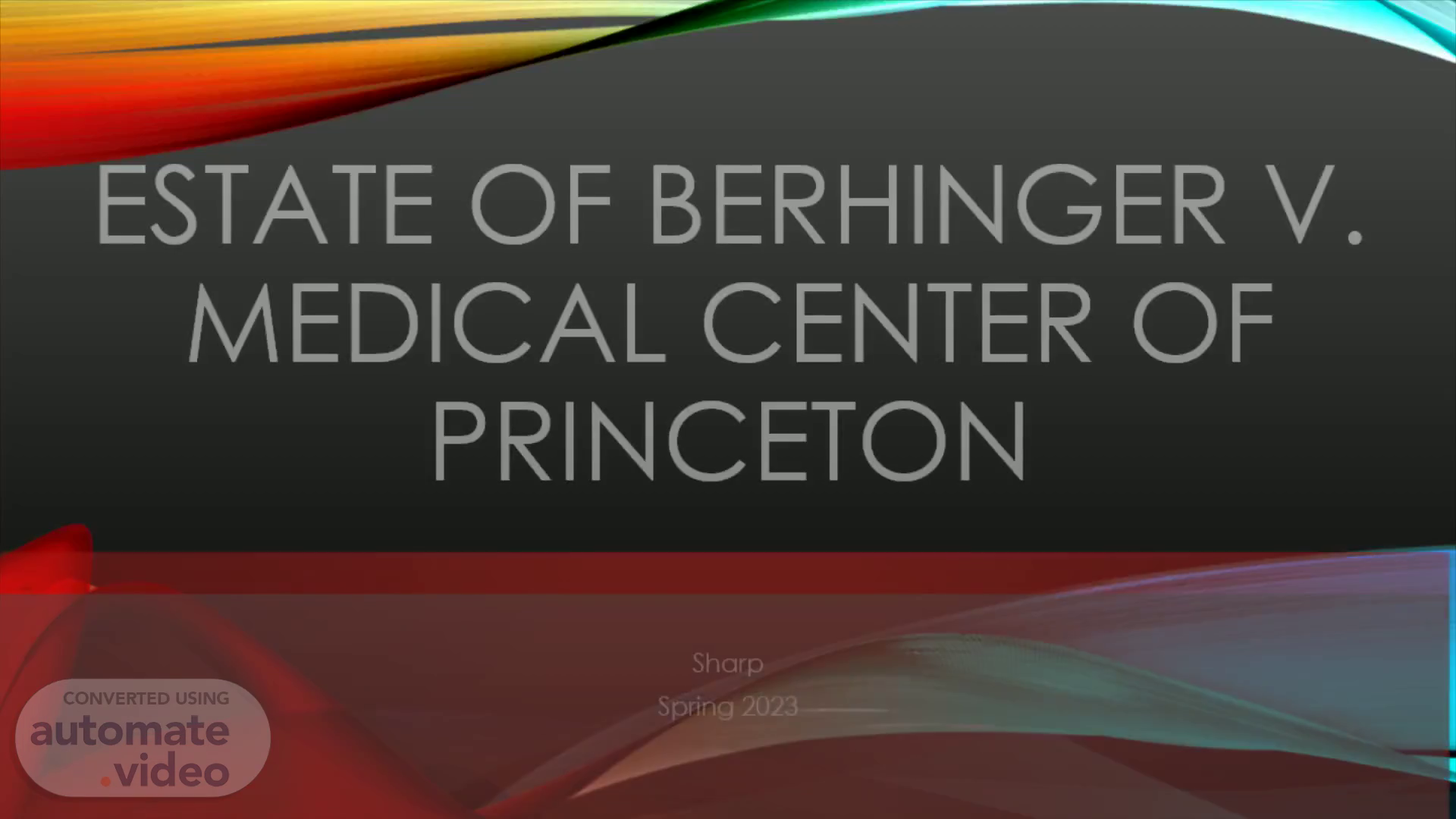
Estate of Berhinger v. Medical Center of Princeton
Scene 1 (0s)
. [Virtual Presenter] Estate of Berhinger v. Medical Center of Princeton.
Scene 2 (8s)
[Audio] In Behringer, the court held that a medical center's failure to take such reasonable measures as are necessary to ensure confidentiality of HIV test results was a breach of the duty and obligation to keep such records confidential, rendering the medical center liable for damages caused by this negligent breach..
Scene 3 (27s)
[Audio] According to the article Legal Aspects of Healthcare Decision-Making, Dr. William Behringer was an ENT and facial Surgeon. However, in June of 1987, he tested positive for the Human Immunodeficiency Virus ( HIV) and was diagnosed with ( AIDS)..
Scene 4 (46s)
[Audio] Behringer was a practicing surgeon at the center which is also where he was diagnosed. Shortly after receiving his diagnosis, Behringer got a numerous amount of phone calls and communication from staff, friends, and eventually from patients..
Scene 5 (1m 3s)
[Audio] Over the course of the next couple of weeks, Dr. Behringer received news from the Chief of Nursing that he has been suspended from all pending surgeries. This decision was made form the concern of the " risk" to Dr. Behringer patients due to his diagnosis. This also covers the center for potential liability..
Scene 6 (1m 24s)
[Audio] However, Dr. William Behringer and the board of trustees had several meetings where they discussed this matter. A special meeting of the board of trustees was held on July 20, 1987..
Scene 7 (1m 39s)
[Audio] At this meeting it was determined that who reiterated that no cases of HIV have been reported from physician to patient. It mentions how "after consideration of all the information presented, the board voted to require the use of a special "informed consent form" to be presented to patients about to undergo surgery by HIV-positive surgeons. The form read as follows:.
Scene 8 (2m 4s)
[Audio] THE MEDICAL CENTER AT PRINCETON, NEW JERSEY SUPPLEMENTAL CONSENT FOR OPERATIVE AND/OR INVASIVE PROCEDURE I have on this date executed a consent, which is attached hereto, for ( Procedure) _______________________________ to be performed by Dr. ____. In addition, I have also been informed by Dr. ____, that he has a positive blood test indicative of infection with HIV ( Human Immunodeficiency Virus) which is the cause of AIDS. I have also been informed of the potential risk of transmission of the virus. ( witness) ( signature of patient)" ( Estate of Behringer v. Medical Center, 249 N.J. Super. 597, 592 A. 2d 1251 ( Law Div. 1991).
Scene 9 (3m 4s)
[Audio] Dr. William Behringer continued to practice his care at the Medical Center despite the exceedingly high rate of cancelations or the number of patients who were concerned for their health and never returned for care..
Scene 10 (3m 17s)
[Audio] Nonetheless, another meeting was held on June 27, 1988, where new policies took place and Behringer lost his privileges, and he could not have any action taken against these new policies..
Scene 11 (3m 30s)
[Audio] During the next two years following his AIDS diagnosis, plaintiff suffered from an ulcer, was hospitalized for one week for a virus, and as a result of his AIDS condition, lost sight in one eye. Plaintiff continued in an office practice until his death on July 2, 1989 ( Estate of Behringer v. Medical Center, 249 N.J. Super. 597, 610 ( Law Div. 1991)..
Scene 12 (4m 4s)
[Audio] Dr. William H. Behringer, is seeking damages for; ( 1) a breach of the medical center's and named employees' duty to maintain confidentiality of plaintiff's diagnosis and test results, and ( 2) a violation of the New Jersey Law Against Discrimination, N.J.S.A. 10: 5-1et seq., as a result of the imposition of conditions on plaintiff's continued performance of surgical procedures at the medical center, revocation of plaintiff's surgical privileges and breach of confidentiality. ( Estate of Behringer v. Medical Center, 249 N.J. Super. 597, 605 ( Law Div. 1991))..
Scene 13 (4m 54s)
[Audio] Plaintiff also claims damages as a result of tortious interference with economic relations. These claims are based on the medical center's suspending and restricting plaintiff's surgical privileges. These claims are derivative. Having determined that the actions of the medical center and Doody were proper, this cause of action must fail. To the extent that this cause of action is based on a breach of confidentiality, plaintiff has prevailed on that cause of action and will be entitled to damages therefore.") Estate of Behringer v. Medical Center, 249 N.J. Super. 597, 658- 59 ( Law Div. 1991).
Scene 14 (5m 45s)
[Audio] Dr. William Behringer won 4 out of 7 counts of the complaints in this case against his defendants.
Scene 15 (5m 56s)
[Audio] The impact on Health Information Management from this case could possibly be an example of how to properly handle privacy from patient records. It showed the laws of patient confidentially along with educating the healthcare system on how to reconstruct policies in order to protect all parties involved..
Scene 16 (6m 15s)
References. Court, N.J., Division, L., & County, M. (1991). Estate of Behringer v. Medical Center at Princeton. Estate of Behringer v. Medical Center, 249 N.J. Super. 597, 592 A.2d 1251 (Law Div. 1991) Saracino , R.M., Kolva , E., & Rosenfeld, B. (2016). Legal Aspects of Healthcare Decision-Making..